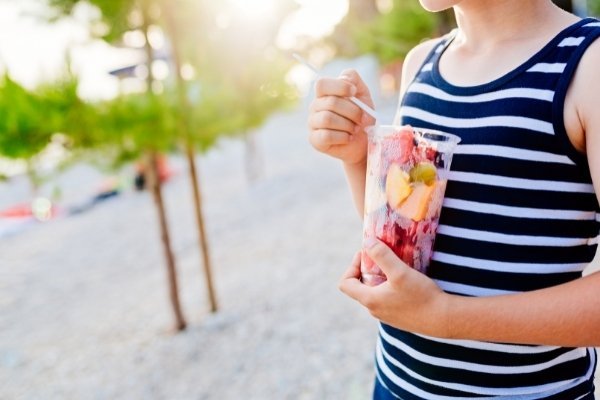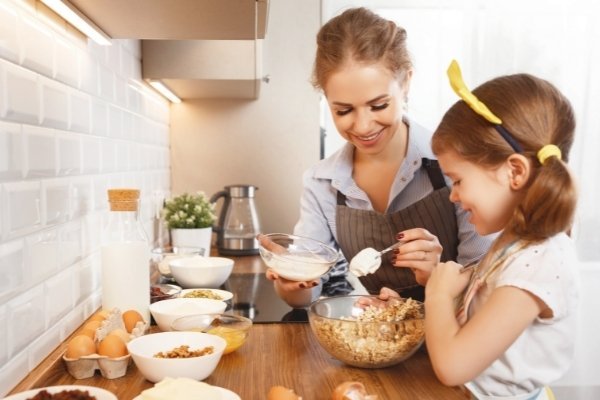
The Importance of Good Hydration and Nutrition
So why is Hydration so Important?
Our bodies depend on water to survive. Every cell, tissue, and organ in needs water to work properly: water is important for our general health and wellbeing.
A 2018 study {1} of over 3,000 adults showed that those who drank more water had a lower risk of anxiety and depression than those who drank less water.
You don’t just have to drink water to stay hydrated!
Although water is recommended for keeping us hydrated, all of our non-alcoholic fluid intake counts (yes, even tea and coffee).
And our food also plays a role in keeping us hydrated: try adding these water rich foods to your diet:
- Cucumber (97% water)
- Tomatoes (95%)
- Spinach (93%)
- Mushrooms (92%)
- Yellow melon (91%)
- Broccoli (90%)
I’m thinking that cucumber sandwiches and a cup of tea would be perfect for Wednesday’s global tea party!

As well as keeping hydrated, there is a strong link between what we eat and our health and wellbeing
Eating a balanced diet is important as it plays a big part in looking after our overall health and giving us the best chance of staying well and feeling good.
A well-balanced diet gives our body the nutrients it needs to function well
Did you know that we are supposed to be eating at least 30 different plant based whole foods a week?
Your 30 should be made up of the foods from the following 6 groups: fruits, vegetables, seeds, nuts, pulses and wholegrains.
Eating a diverse diet will allow the trillions of bacteria that line our guts to flourish because each type of bacteria likes a different kind of plant food.
Planning meals is a good way of ensuring that we achieve this diversity in our diets – when you see your meals written down, it makes you much more mindful about your food choices.

Increasing the amount of whole foods in our diets is easy – it just takes a little planning!
- Throw a handful of spinach (frozen or fresh) into your pasta sauces or stews. It’s also an easy addition to sandwiches, quiches and tarts;
- Add dried red lentils to pasta sauces and soups. You can add them raw; they take about 10 minutes to cook;
- Make your own hummus from a can of chickpeas, some olive oil, salt, garlic, lemon juice and tahini paste: I like to spread it on my burger buns or flatbreads. It goes brilliantly with chicken, lamb or halloumi and is such an easy way of adding a burst of flavour and some extra goodness into your week;
- Use the 50:50 method when cooking with minced meat. 50% mince and 50% finely chopped mushrooms (I use my food processor). It works particularly well if you have family members who don’t like mushrooms – my children don’t even notice;
- Try adding grated cauliflower and grated carrot to your rice – another easy way to sneak in a little goodness!
And wholefoods aren’t just for savoury cooking
How about giving these delicious apple and oat muffins a go: they contain 3 different plant based whole foods and make a great sweet treat.

Perfect for our Global Tea Party on Wednesday
Makes 12
- 140g plain flour
- 1tbsp baking powder
- 1 tsp ground mixed spice
- 3tbsp ground flaxseed (optional)
- 50g soft brown sugar
- 175g porridge oats
- 3 apples (cooking/eating) – peeled, cored and finely chopped
- 2 eggs
- 125ml milk
- 125 fresh apple juice
- 6 tbsp oil
- Preheat the oven to 200°C and line a 12-cup muffin tin
- In a large bowl mix the four, baking powder, mixed spice and flaxseed
- Stir in the sugar, oats and apples
- In a separate bowl lightly beat the eggs; add the milk, apple juice and oil and continue to beat until they are combined
- Pour the liquid into the dry ingredients and stir to combine (do not over mix)
- Share the mixture between the 12 cases and add a sprinkling of oats to the top of each
- Bake for 20-25 minutes – they should be risen and golden brown
- Leave to cool for about 5 minutes and then transfer to a wire rack
{1} https://www.ncbi.nlm.nih.gov/pmc/articles/PMC6147771/


